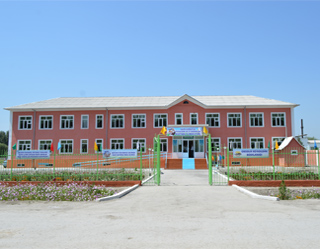
The project has been implemented in Uzbekistan since 2009. The project aims at reducing energy consumption and associated greenhouse gas emissions in public buildings in Uzbekistan, particularly in the healthcare and educational sectors (schools, colleges, rural health clinics and hospitals), by improving building norms and standards, demonstrating integrated building design approaches, and developing the capacity of local specialists in design, construction, and maintenance.
The project covered eight public buildings to improve energy efficiency, of which two were new buildings and six existing. One of such objects is a school No. 2 in Rishtan (Ferghana region), which is designed for 320 people.
Before the reconstruction the school consumed 315,200 KWH of energy to heating a year. The reconstruction helped to cut energy consumption by 60.7% to 123,700 KWH a year. The coal consumption also decreased by 60.7% to 37,600 tonnes a year and greenhouse gas emission – by 60.7% to 32,200 CO2.
School No. 39 of Kurgantepa district of Andijan region was also reconstructed within the UNDP project. Introduction of energy efficient technologies helped to cut consumption of energy at school by 40%. The annual energy consumption fell from 498,176 KWH to 206,912 KWH and coal – from 151,400 tonnes to 93,300 tonnes. Greenhouse gas emission was cut from 169,900 tonnes to 104,600 tonnes of CO2.
According to the UNDP project, the reconstruction of Rishtan school required US$251,600 (share of the government – US$211,400 and the project – US$40,200) and Kurgantepa school – US$541,400 (government – US$439,400 and project – US$102,000).
Head of the component of the project on demonstrative objects Alisher Temirov said that the first task of the project was to meter heat consumption in winter and summer period. The heating leakage places were also determined.
Within the reconstruction of the buildings, thermal isolation materials were installed. Windows and doors were replaced with aluminum and plastic profiles. Heat-reflecting screens were also installed. Heating and ventilation system was modernized.
According to the calculations, the expenses directed to energy efficiency measures will pay off within 8-10 if not to take into account growth or prices for energy. But now schools have more comfortable conditions for education of children. The schools are warm in winter and cool in summer periods.